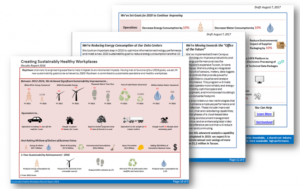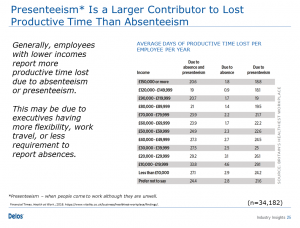This website uses cookies so that we can provide you with the best user experience possible. Cookie information is stored in your browser and performs functions such as recognising you when you return to our website and helping our team to understand which sections of the website you find most interesting and useful.
October 4, 2017
Sustainability Roundtable Collaborates with Leading Industry Experts to Build Business Case for Sustainably Healthy Workplaces Portfolio-wide
Over the past 3 quarters of 2017, SR Inc has built upon previous years of research and collaboration with Member-Clients to develop a highly practicable stepwise process to develop and implement a portfolio-wide sustainable, healthy workplace strategy. At a 3rd quarter Symposium SR Inc hosted at its headquarters in Cambridge, MA, Director of Research & Consulting Peter Crawley provided an overview of this process and accompanying toolkit – an “Implementation Playbook for Sustainably Healthy Workplaces Portfolio-wide” – which draws from industry-leading research and expertise.
The process closely aligns with SR Inc’s higher-level guidance for developing and implementing a strategy for more sustainable operations, but emphasizes the value of integrating health and wellness considerations. The Playbook is comprised of 5 stages, each with accompanying implementation guidance and tools, targeted at Real Estate, Sustainability and Human Resource personnel seeking to build a business case for greater sustainability and health in the workplace. The 5 steps of the system include relevant tools, some of which are listed below:
- Step 1: Who? – Governance
- Guidance for developing Governance protocols & Cross Departmental teams (CRE, HR, IT, etc.)
- Step 2: What? – Strategy
- Guidance for developing Balanced Scorecard outlining Objectives & Goals
- Step 3: Why? – Business Case
- Guidance for conducting Cost/Benefit Analysis – Capturing health & wellness impacts
- Step 4: How? – Metrics and Methods
- Sustainably Healthy Workplace (SHW) Features benchmarking tool – Gap Analysis
- Guidance for Quantifying SHW Impacts on Employee Performance
- Employee Satisfaction/Engagement Survey Guidance
- Step 5: When? – Performance Tracking & Reporting
- SHW Performance Dashboard tool
- Reporting Guidance & Template

The Governance tool (Step 1) provides best practice guidance for developing a governance structure to support a SHW strategy that engages multiple departments beyond CRE – most notably, Human Resources – to foster joint decision-making and collaboration and align with a greater number of internal stakeholders, attract greater support from the C-Suite, and allow for program costs and benefits to be distributed across both CRE and HR budgets. It also provides case study examples of the organizational structures and policies that companies have established to govern their SHW strategies.
Once a governance structure has been established, a SHW Committee will need to develop goals and objectives for its program. The Strategy Scorecard and accompanying guidance (Step 2) aligns initiatives and key performance indicators specific to sustainability and health in the workplace with 4 key business perspectives: Financial Performance, Internal Customer (i.e. Employee) Satisfaction, Sustainable Business Processes, and Sustainable Capacity & Risk Management. By identifying how specific SHW initiatives progress one or more of these business perspectives, adapted from a more traditional Balanced Scorecard, a Strategy Scorecard helps the SHW Committee to develop portfolio-wide, employee-centered sustainability initiatives that align with multiple stakeholders and an enterprise-wide strategy – helping them to gain traction with upper management and ultimately be better resourced.

The third step guides a SHW Committee through a cost-benefit analysis of potential SHW initiatives that introduces health-related costs into the equation. This “reframed” cost-benefit analysis encourages heads of Real Estate to account for the reductions in workforce health-related costs (e.g. absenteeism, turnover, health insurance costs, productivity, presenteeism, etc.) in addition to benefits traditionally associated with building investments, such as energy savings and space reductions.
Step 4 identifies metrics and best practice methodologies that companies use to measure the relative health of buildings within their portfolio. Drawing from industry-leading research and expertise, SR Inc has developed a simple, usable benchmark tool for CRE directors to efficiently identify and prioritize opportunities for improved health in the workplace. Tools comprising this stage of the Playbook also help users to employ best practice methodologies for quantifying impacts of healthy workplace investments on employee performance metrics, such as absenteeism, employee satisfaction, health costs, productivity, revenue and turnover. This includes a discussion of best practices and limitations to working with data sourced from HR. Additionally, SR Inc provides guidance and referrals to industry leading Employee Satisfaction and Engagement surveys, to gather powerful qualitative evidence for needed investments in SHW.

The 5th and final step of this Playbook provides guidance and tools for tracking and reporting data related to SHW investments. SR Inc has developed a Performance Dashboard that companies can use to track employee performance data related to health and wellness. A template of a summary Results Report complements this tool and presents data in a clear and flexible format.

SR Inc is pleased to collaborate with Delos, developer of the WELL Building Standard, to develop this 5-step Playbook based on the latest research and industry trends, while presenting them in a highly-focused format for efficient and effective use by CRE professionals. At SR Inc’s 3rd quarter Symposium, Dr. Whitney Austin Gray, Delos’s Executive Director of Research and Innovation, discussed key industry research publications that communicate the value of health and well-being in the built environment. This special edition presentation of Delos’s “Industry Insights 2017,” which Member-Clients can download by emailing delos.insights@delos.com, summarizes 14 studies revealing the latest insights into workplace wellness programs, health-related employee performance metrics, employee health costs, and more from sources such as the American Heart Association, Fidelity Investments, and Gallup. SR Inc and Delos enthusiastically invite Member-Clients to provide feedback on these tools and pilot them within their organization so that we can maximize their effectiveness and help to drive forward progress in the movement for more sustainable, healthy workplaces across companies and industries.
Select Relevant SBER Executive Guidance & Tools:
- Member Advisories:
- Member Briefings:
- Member SBER Full Reports:
- Member Executive Tools:
- 2017 Symposia Presentations:
 As a Senior Manager of Research & Consulting at SR Inc, Kelsey Wallace supports research, development and implementation of enterprise sustainability strategies for companies that recognize the business imperative of more sustainable operations in the face of climate change and an increasingly resource-constrained world. Prior to joining Sustainability Roundtable, Inc., Kelsey worked for an environmental/engineering consulting firm where she supported clients including the U.S. Environmental Protection Agency and the U.S. Green Buildings Council to promote sustainable buildings, clean energy, and safe drinking water. Kelsey also devoted a year to national service with the AmeriCorps National Civilian Community Corps, where she worked on team-based conservation and community development projects throughout the Southwest United States. Kelsey has her B.A. in Environmental Studies from Connecticut College.
As a Senior Manager of Research & Consulting at SR Inc, Kelsey Wallace supports research, development and implementation of enterprise sustainability strategies for companies that recognize the business imperative of more sustainable operations in the face of climate change and an increasingly resource-constrained world. Prior to joining Sustainability Roundtable, Inc., Kelsey worked for an environmental/engineering consulting firm where she supported clients including the U.S. Environmental Protection Agency and the U.S. Green Buildings Council to promote sustainable buildings, clean energy, and safe drinking water. Kelsey also devoted a year to national service with the AmeriCorps National Civilian Community Corps, where she worked on team-based conservation and community development projects throughout the Southwest United States. Kelsey has her B.A. in Environmental Studies from Connecticut College.
 Peter Crawley, Director of Research & Consulting at SR Inc , has led at the intersection of strategic consulting, real estate and sustainability for more than 15 years, serving as the principal advisor to top real estate owners and scores of operating companies. Peter has helped the executive teams at these enterprises develop and implement highly profitable Sustainability Strategies. Prior to joining SR Inc, Peter served as the Director of Sustainability Services at the environmental engineering firm EBI Consulting. Peter is LEED accredited and has deep experience working on energy efficiency issues, product life cycle improvements, and greenhouse gas measurement, reduction, and reporting. He has worked on numerous LEED certification and high-performance building projects, and designed and implemented company-wide behavioral change programs to advance sustainability goals and enhance employee engagement. Peter received his BA from Amherst College, his MS in Real Estate from Columbia University and his MA in Sustainability & Environmental Management from Harvard University.
Peter Crawley, Director of Research & Consulting at SR Inc , has led at the intersection of strategic consulting, real estate and sustainability for more than 15 years, serving as the principal advisor to top real estate owners and scores of operating companies. Peter has helped the executive teams at these enterprises develop and implement highly profitable Sustainability Strategies. Prior to joining SR Inc, Peter served as the Director of Sustainability Services at the environmental engineering firm EBI Consulting. Peter is LEED accredited and has deep experience working on energy efficiency issues, product life cycle improvements, and greenhouse gas measurement, reduction, and reporting. He has worked on numerous LEED certification and high-performance building projects, and designed and implemented company-wide behavioral change programs to advance sustainability goals and enhance employee engagement. Peter received his BA from Amherst College, his MS in Real Estate from Columbia University and his MA in Sustainability & Environmental Management from Harvard University.

